Our chapters have been submitting stories of their impactful projects of 2020, and we have picked out a few to share in this newsletter issue. We're so impressed with the ways that VMN volunteers found to still make a difference, despite all the challenges of the year.
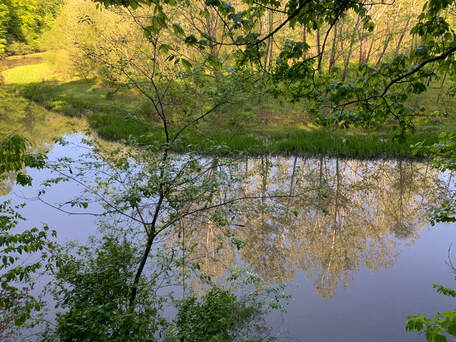 Ivy Creek Natural Area, in Albemarle County. Photo by Michelle Prysby.
Ivy Creek Natural Area, in Albemarle County. Photo by Michelle Prysby. Creating Virtual Tours of an Albemarle County Natural Area
--Submitted by Karen Mulder, VMN Rivanna Chapter
This year many of the routine educational volunteer programs Rivanna Master Naturalists participate in were curtailed. Our volunteers got creative to bring nature to the public and keep education alive.
At the Ivy Creek Natural Area at least seven different volunteers worked with Catherine Boston, Ivy Creek Foundation's Director of Education, to create several audio and virtual tours. An amazing open source app called izi.TRAVEL is used for the tours. It is GPS enabled so that, when you walk the site, the audio will automatically trigger as you enter the "trigger zone" the developer sets up. For Ivy Creek, trigger zones were set up on different loop trails, usually a mile or more. The beauty of izi.TRAVEL is that you can walk it, or listen from your phone anywhere you are, including your car, or on your desktop per the links provided.
There are several series available such as “Listening to the Landscape”, including titles about the trees, plants, wildlife habitat, a water and geology walk, and the history and the inspiring African-American narrative of the Carr-Greer family, who established River View Farm located at Ivy Creek. With the plant tours, Ivy Creek was able to keep the tradition of monthly plant walks alive just when people most needed those familiar happenings. The plant walks were ephemeral (lasting only as long as the blooms on the plants allowed) but reached a wide range of people--those at home on their computers, those who could come individually to Ivy Creek with their phones and those who came with the downloaded plant list and a guidebook. Volunteers and Staff were also able to create longer lasting tours that can be used by families looking for outdoor educational experiences for their children, teachers who are trying to find creative ways to blend digital learning with outdoor experiences and naturalists who just want to add a little education to their walks at Ivy Creek.
--Submitted by Karen Mulder, VMN Rivanna Chapter
This year many of the routine educational volunteer programs Rivanna Master Naturalists participate in were curtailed. Our volunteers got creative to bring nature to the public and keep education alive.
At the Ivy Creek Natural Area at least seven different volunteers worked with Catherine Boston, Ivy Creek Foundation's Director of Education, to create several audio and virtual tours. An amazing open source app called izi.TRAVEL is used for the tours. It is GPS enabled so that, when you walk the site, the audio will automatically trigger as you enter the "trigger zone" the developer sets up. For Ivy Creek, trigger zones were set up on different loop trails, usually a mile or more. The beauty of izi.TRAVEL is that you can walk it, or listen from your phone anywhere you are, including your car, or on your desktop per the links provided.
There are several series available such as “Listening to the Landscape”, including titles about the trees, plants, wildlife habitat, a water and geology walk, and the history and the inspiring African-American narrative of the Carr-Greer family, who established River View Farm located at Ivy Creek. With the plant tours, Ivy Creek was able to keep the tradition of monthly plant walks alive just when people most needed those familiar happenings. The plant walks were ephemeral (lasting only as long as the blooms on the plants allowed) but reached a wide range of people--those at home on their computers, those who could come individually to Ivy Creek with their phones and those who came with the downloaded plant list and a guidebook. Volunteers and Staff were also able to create longer lasting tours that can be used by families looking for outdoor educational experiences for their children, teachers who are trying to find creative ways to blend digital learning with outdoor experiences and naturalists who just want to add a little education to their walks at Ivy Creek.
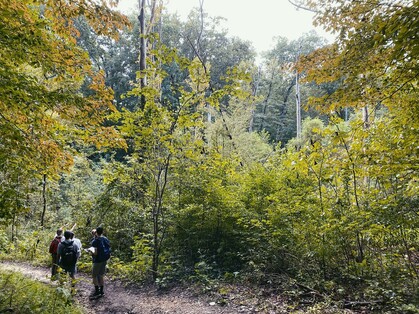 W&M COLL of the WILD students at Bassett Trace Nature Trail in Williamsburg. Photo by Linda Morse.
W&M COLL of the WILD students at Bassett Trace Nature Trail in Williamsburg. Photo by Linda Morse. Training New College-Age Volunteers
--Submitted by Ricklin Brown, Adrienne Frank, and Linda Morse, VMN Historic Rivers Chapter
COLL of the WILD is a new William & Mary (W&M) natural history course based on the Virginia Master Naturalist (VMN) basic training curriculum (with W&M writing requirements). Seven new members joined the Historic Rivers Chapter (HRC) in February 2020 after completing all requirements during their winter break. The Chapter is looking forward to working with this dynamic cohort.
Natural history used to be taught in most universities across the U.S. The number of general natural history courses declined during the 1960s and there are none taught in Virginia Universities today. Subjects within natural history such as ecology, ecosystems, wetlands, reptiles, geology, etc. are taught as distinct courses. The inter-connectedness of nature is lacking in subject courses like these which is why the VMN Basic Training program is so important to creating naturalists. The Historic Rivers Chapter of the VMN program was keen on training younger naturalists and gave their full support to Linda Morse, the professor of the new course and Certified VMN in Historic Rivers Chapter.
The inaugural W&M class started basic training on August 20, 2020 under COVID-19 restrictions which meant lectures were on-line using Zoom. Field trips were in small groups, socially distanced while wearing masks and using lots of hand sanitizer. Did social distancing hurt the fellowship? No. The field trips encouraged collegiality. They waded in College Creek to net macroinvertebrates. They did a very early morning campus bird walk which ended when the skies opened up with buckets of rain. They hiked Bassett’s Trace Nature Trail to identify trees and understand energy flow and carbon cycling through uplands and wetlands. They learned that millions of years ago W&M Campus and the Coastal Plain was inundated by seas containing abundant mollusks.
In all, there were twenty-four (24) zoom meetings which made it easier to find guest lecturers from all over Virginia to cover the variety of topics for the training. Institutions that helped were William & Mary, Virginia Institute of Marine Science, Hampton University, Virginia Department of Forestry, Fort Eustis and several Historic Rivers Chapter members. The Chapter was especially involved and helped with lectures and field trips.
The students also satisfied W&M requirements. A COLL 150 (GEOL 150) class is for newcomers to W&M and is part of the College Curriculum (COLL) which is writing intensive. They wrote: 1) two Field Trip Reports from Saturday field trips which is strict scientific writing with observations, methods and conclusions; 2) two Reflections on Nature, a free-style storytelling; 3) in their Naturalist Notebook, note-taking while in the field with drawings; and 4) a Scientific Research Paper, answering the question: “How do Humans impact nature in positive, negative or both ways?” using primary literature.
“W&M Cohort 1” is more than ready to volunteer as citizen scientists, educators and stewards of nature. Their first project will be to monitor a new bluebird trail on W&M campus. Chapter members are very excited to volunteer with this young cohort and get them involved in many projects. These young naturalists can look forward to spending time outdoors with other naturalists, to appreciate and observe nature and understand how important the role of human interactions with nature are. Hopefully, what they learn stays with them throughout their lives so they can teach future generations too.
Our Chapter member Linda Morse deserves the accolades for all that she has done to support the Historic Rivers Chapter of the VMNs. We would like to also acknowledge her efforts for developing the COLL OF THE WILD course.
For the past 3 years, she has served as our Vice President and Programs Chair. Her excellent coordination and ease of presentation has made that role look easy. She has found excellent speakers for our monthly General Meetings, including this year’s speakers who were willing to work by Zoom. She passes her role on this March.
--Submitted by Ricklin Brown, Adrienne Frank, and Linda Morse, VMN Historic Rivers Chapter
COLL of the WILD is a new William & Mary (W&M) natural history course based on the Virginia Master Naturalist (VMN) basic training curriculum (with W&M writing requirements). Seven new members joined the Historic Rivers Chapter (HRC) in February 2020 after completing all requirements during their winter break. The Chapter is looking forward to working with this dynamic cohort.
Natural history used to be taught in most universities across the U.S. The number of general natural history courses declined during the 1960s and there are none taught in Virginia Universities today. Subjects within natural history such as ecology, ecosystems, wetlands, reptiles, geology, etc. are taught as distinct courses. The inter-connectedness of nature is lacking in subject courses like these which is why the VMN Basic Training program is so important to creating naturalists. The Historic Rivers Chapter of the VMN program was keen on training younger naturalists and gave their full support to Linda Morse, the professor of the new course and Certified VMN in Historic Rivers Chapter.
The inaugural W&M class started basic training on August 20, 2020 under COVID-19 restrictions which meant lectures were on-line using Zoom. Field trips were in small groups, socially distanced while wearing masks and using lots of hand sanitizer. Did social distancing hurt the fellowship? No. The field trips encouraged collegiality. They waded in College Creek to net macroinvertebrates. They did a very early morning campus bird walk which ended when the skies opened up with buckets of rain. They hiked Bassett’s Trace Nature Trail to identify trees and understand energy flow and carbon cycling through uplands and wetlands. They learned that millions of years ago W&M Campus and the Coastal Plain was inundated by seas containing abundant mollusks.
In all, there were twenty-four (24) zoom meetings which made it easier to find guest lecturers from all over Virginia to cover the variety of topics for the training. Institutions that helped were William & Mary, Virginia Institute of Marine Science, Hampton University, Virginia Department of Forestry, Fort Eustis and several Historic Rivers Chapter members. The Chapter was especially involved and helped with lectures and field trips.
The students also satisfied W&M requirements. A COLL 150 (GEOL 150) class is for newcomers to W&M and is part of the College Curriculum (COLL) which is writing intensive. They wrote: 1) two Field Trip Reports from Saturday field trips which is strict scientific writing with observations, methods and conclusions; 2) two Reflections on Nature, a free-style storytelling; 3) in their Naturalist Notebook, note-taking while in the field with drawings; and 4) a Scientific Research Paper, answering the question: “How do Humans impact nature in positive, negative or both ways?” using primary literature.
“W&M Cohort 1” is more than ready to volunteer as citizen scientists, educators and stewards of nature. Their first project will be to monitor a new bluebird trail on W&M campus. Chapter members are very excited to volunteer with this young cohort and get them involved in many projects. These young naturalists can look forward to spending time outdoors with other naturalists, to appreciate and observe nature and understand how important the role of human interactions with nature are. Hopefully, what they learn stays with them throughout their lives so they can teach future generations too.
Our Chapter member Linda Morse deserves the accolades for all that she has done to support the Historic Rivers Chapter of the VMNs. We would like to also acknowledge her efforts for developing the COLL OF THE WILD course.
For the past 3 years, she has served as our Vice President and Programs Chair. Her excellent coordination and ease of presentation has made that role look easy. She has found excellent speakers for our monthly General Meetings, including this year’s speakers who were willing to work by Zoom. She passes her role on this March.
Reaching Out to the Community to Discuss Deer Management
--Submitted by Kasha Helget, VMN Arlington Regional Chapter
In the last few years, members of the Arlington Regional Master Naturalist Chapter (ARMN) have spearheaded public education to alert the community to the effects of deer browsing and begin the process of addressing barriers to developing an effective and humane program to control deer population in Arlington County. They worked on deer browse surveys, major outreach events with the Virginia Native Plant Society, the Deer Advisory Council for Northern Virginia, Arlington’s Urban Forestry and Environmental Services departments, and in 2019, with regional experts from VA, MD, and DC to create a volunteer training and public presentation that has been delivered over 40 times in the past two years.
The campaign volunteers have worked tirelessly to reach Arlington County Board members, School Board members, the County Manager, the Chair of the Department of Parks and Recreation, and the Acting Chief of Police. Presentations have been made to employees in the Park and Recreation department and to several Arlington County civic commissions who have supported this message with letters to the County Board.
Their advocacy has branched out to civic/neighborhood associations, garden clubs, Extension Master Gardener volunteers, local TV and social media, and they have been invited to speak at regional parks and conservancy and hunting club meetings. ARMN ‘s education and outreach has done much to bring the issue forward, engage stakeholders, and provide county decision-makers with sound, unbiased information for their consideration of a deer management plan.
For this work on public outreach and education related to deer management, ARMN was selected as the 2020 recipient of the A. Willis Robertson Award presented by the Virginia Chapter of The Wildlife Society. The award honors a wildlife non-professional or group that has exercised outstanding conservation practices on their own land or have made significant contributions to conservation activities in the Commonwealth.
--Submitted by Kasha Helget, VMN Arlington Regional Chapter
In the last few years, members of the Arlington Regional Master Naturalist Chapter (ARMN) have spearheaded public education to alert the community to the effects of deer browsing and begin the process of addressing barriers to developing an effective and humane program to control deer population in Arlington County. They worked on deer browse surveys, major outreach events with the Virginia Native Plant Society, the Deer Advisory Council for Northern Virginia, Arlington’s Urban Forestry and Environmental Services departments, and in 2019, with regional experts from VA, MD, and DC to create a volunteer training and public presentation that has been delivered over 40 times in the past two years.
The campaign volunteers have worked tirelessly to reach Arlington County Board members, School Board members, the County Manager, the Chair of the Department of Parks and Recreation, and the Acting Chief of Police. Presentations have been made to employees in the Park and Recreation department and to several Arlington County civic commissions who have supported this message with letters to the County Board.
Their advocacy has branched out to civic/neighborhood associations, garden clubs, Extension Master Gardener volunteers, local TV and social media, and they have been invited to speak at regional parks and conservancy and hunting club meetings. ARMN ‘s education and outreach has done much to bring the issue forward, engage stakeholders, and provide county decision-makers with sound, unbiased information for their consideration of a deer management plan.
For this work on public outreach and education related to deer management, ARMN was selected as the 2020 recipient of the A. Willis Robertson Award presented by the Virginia Chapter of The Wildlife Society. The award honors a wildlife non-professional or group that has exercised outstanding conservation practices on their own land or have made significant contributions to conservation activities in the Commonwealth.
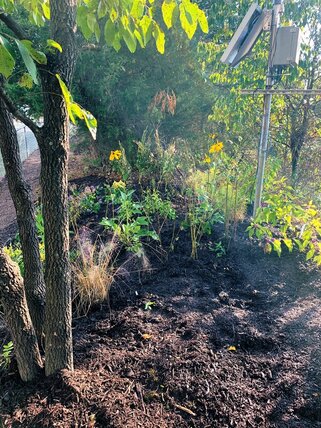 Pollinator garden at Patriot Pond, the outdoor classroom of Patriot High School in Prince William County. Photo by Melinda Landry.
Pollinator garden at Patriot Pond, the outdoor classroom of Patriot High School in Prince William County. Photo by Melinda Landry. Creating an Outdoor Classroom in Prince William County
--Submitted by Melinda Landry, VMN Merrimac Farm Chapter
The Patriot High School outdoor classroom at what is fondly referred to as Patriot Pond has been a multi-year project involving volunteers from Merrimac Farm Master Naturalists, local Eagle Scouts, and more. The project began with an overgrown area surrounding a natural pond fenced off behind Patriot High School. Starting with clearing a path around the pond, facilities personnel and a local Eagle Scout worked to create a mulched pathway so that students would have 360-degree access inside the perimeter of the fenced area surrounding the pond. A subsequent scout built outdoor stand-up tables to complete the transition to an outdoor classroom area.
Since this time, multiple projects have been worked on within the outdoor classroom area. Two pollinator planting beds have been installed and continue to be weeded and replanted. A concerted effort has begun to remove invasive Japanese Honeysuckle, Tree of Heaven, and other invasive species found within the fenced area. Maintenance of the trail mulched path is a continuous project requiring volunteer time.
In addition to the physical and biological aspects of the pond area, lessons have been created for students to use while out at the pond that spans more than science objectives. The culinary program went out and collected native persimmons to use in their cooking classes. Photography students have used the natural area to practice their photographic skills. Special needs students have enjoyed learning more about nature through visits to the pond area and the introduction of vocabulary terms like evergreen and pollinator.
Check out photos of events that occurred before lockdown at the pond's Twitter page @PatriotPond. As we move back to in-person learning, we're hoping that the outdoor classroom area will be a frequently visited site.
--Submitted by Melinda Landry, VMN Merrimac Farm Chapter
The Patriot High School outdoor classroom at what is fondly referred to as Patriot Pond has been a multi-year project involving volunteers from Merrimac Farm Master Naturalists, local Eagle Scouts, and more. The project began with an overgrown area surrounding a natural pond fenced off behind Patriot High School. Starting with clearing a path around the pond, facilities personnel and a local Eagle Scout worked to create a mulched pathway so that students would have 360-degree access inside the perimeter of the fenced area surrounding the pond. A subsequent scout built outdoor stand-up tables to complete the transition to an outdoor classroom area.
Since this time, multiple projects have been worked on within the outdoor classroom area. Two pollinator planting beds have been installed and continue to be weeded and replanted. A concerted effort has begun to remove invasive Japanese Honeysuckle, Tree of Heaven, and other invasive species found within the fenced area. Maintenance of the trail mulched path is a continuous project requiring volunteer time.
In addition to the physical and biological aspects of the pond area, lessons have been created for students to use while out at the pond that spans more than science objectives. The culinary program went out and collected native persimmons to use in their cooking classes. Photography students have used the natural area to practice their photographic skills. Special needs students have enjoyed learning more about nature through visits to the pond area and the introduction of vocabulary terms like evergreen and pollinator.
Check out photos of events that occurred before lockdown at the pond's Twitter page @PatriotPond. As we move back to in-person learning, we're hoping that the outdoor classroom area will be a frequently visited site.
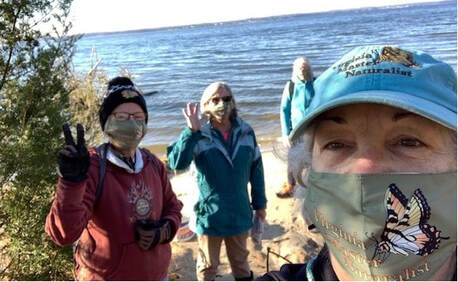 Anne Clewell, far right, with other NNMNs on a shoreline cleanup for the Winter Nature Challenge in December, 2020. Photo by Anne Clewell.
Anne Clewell, far right, with other NNMNs on a shoreline cleanup for the Winter Nature Challenge in December, 2020. Photo by Anne Clewell. A "Winter Nature Challenge”
--Submitted by Camille Grabbe, VMN Northern Neck Chapter
Covid has required that everyone adapt and adjust this year, and Northern Neck Master Naturalist members have been particularly accommodating. For our annual holiday party, since large gatherings could not be held indoors, our Hospitality Chair Anne Clewell had a great vision for an inspiring Sunday afternoon spent at a local state park with three separate, small group nature projects and a bonfire complete with “s’mores.” Unfortunately, as soon as those plans were made, the rising Covid rates once again forced the governor to implement more restrictions on gatherings, so the well-laid plans had to be abandoned. Not to be deterred, Anne quickly formulated a new, virtual and “own backyard” plan that would last for a month. Prior to the kick-off, a committee met (outdoors, masked, and distanced) to assemble the goodie bags to be given to participants prior to the event. The goodie bag consisted of the snack for the first Zoom meeting (pre-packaged ingredients for s’mores), a snack for the culminating Zoom gathering in January (hot chocolate mix and a bag of microwave popcorn), and a small, hand-made by Anne, accordion-fold nature journal for making notations about the nature challenges. Goodie bags were delivered by MN volunteers to the homes of the people who registered for the event.
The “kick-off” was held on Sunday, December 13, at 2:00 pm, via Zoom. In this session, Anne explained each of the three different challenges (projects) that we could choose to complete (on our own, with family members, or in small MN groups). She also provided the training needed for using the apps that would be utilized. Covid protocols for those going out in small MN groups were stressed: masks, socially distancing, no sharing of equipment, use of hand sanitizer, and completing and sending to an advisor the current Covid checklist.
The first challenge was “Shoreline Stewardship” at a local park or NAP. We would report the results of our litter campaign using the Clean Swell app under the group name, “NNMN 2020 Winter Nature Challenge.”
Challenges 2 and 3 were both citizen science, “Flora and Fauna Data Collection.” Project 2 was iNaturalist “Biodiversity of the Northern Neck.” Participants were asked to note and photograph wildlife and plants in and around their own homes or a local natural area and upload to iNaturalist. The third project was a Northern Neck Winter Bird Count. Participants would report birds using the “eBird” app from Cornell Lab.
Pictures from any of the projects were added to a specific chapter “Cluster” site. On the last day of the challenge, Sunday, January 10, the group met, again via Zoom, to view the Cluster photos, discuss the month-long challenge, and to enjoy hot chocolate and popcorn from our own homes.
Two dozen master naturalists and their families participated, and five “friends” and/or potential BTC candidates were involved as well. Kudos to our hospitality chair, Anne Clewell, for not being deterred by the ever-changing Covid protocols, and for still providing an unusual, but engaging, way for all of us to enjoy the season as well as our fellow VMNs (virtually!). We were also able to contribute to several of our chapter projects at a time when Covid protocols had limited our activity during 2020.
--Submitted by Camille Grabbe, VMN Northern Neck Chapter
Covid has required that everyone adapt and adjust this year, and Northern Neck Master Naturalist members have been particularly accommodating. For our annual holiday party, since large gatherings could not be held indoors, our Hospitality Chair Anne Clewell had a great vision for an inspiring Sunday afternoon spent at a local state park with three separate, small group nature projects and a bonfire complete with “s’mores.” Unfortunately, as soon as those plans were made, the rising Covid rates once again forced the governor to implement more restrictions on gatherings, so the well-laid plans had to be abandoned. Not to be deterred, Anne quickly formulated a new, virtual and “own backyard” plan that would last for a month. Prior to the kick-off, a committee met (outdoors, masked, and distanced) to assemble the goodie bags to be given to participants prior to the event. The goodie bag consisted of the snack for the first Zoom meeting (pre-packaged ingredients for s’mores), a snack for the culminating Zoom gathering in January (hot chocolate mix and a bag of microwave popcorn), and a small, hand-made by Anne, accordion-fold nature journal for making notations about the nature challenges. Goodie bags were delivered by MN volunteers to the homes of the people who registered for the event.
The “kick-off” was held on Sunday, December 13, at 2:00 pm, via Zoom. In this session, Anne explained each of the three different challenges (projects) that we could choose to complete (on our own, with family members, or in small MN groups). She also provided the training needed for using the apps that would be utilized. Covid protocols for those going out in small MN groups were stressed: masks, socially distancing, no sharing of equipment, use of hand sanitizer, and completing and sending to an advisor the current Covid checklist.
The first challenge was “Shoreline Stewardship” at a local park or NAP. We would report the results of our litter campaign using the Clean Swell app under the group name, “NNMN 2020 Winter Nature Challenge.”
Challenges 2 and 3 were both citizen science, “Flora and Fauna Data Collection.” Project 2 was iNaturalist “Biodiversity of the Northern Neck.” Participants were asked to note and photograph wildlife and plants in and around their own homes or a local natural area and upload to iNaturalist. The third project was a Northern Neck Winter Bird Count. Participants would report birds using the “eBird” app from Cornell Lab.
Pictures from any of the projects were added to a specific chapter “Cluster” site. On the last day of the challenge, Sunday, January 10, the group met, again via Zoom, to view the Cluster photos, discuss the month-long challenge, and to enjoy hot chocolate and popcorn from our own homes.
Two dozen master naturalists and their families participated, and five “friends” and/or potential BTC candidates were involved as well. Kudos to our hospitality chair, Anne Clewell, for not being deterred by the ever-changing Covid protocols, and for still providing an unusual, but engaging, way for all of us to enjoy the season as well as our fellow VMNs (virtually!). We were also able to contribute to several of our chapter projects at a time when Covid protocols had limited our activity during 2020.
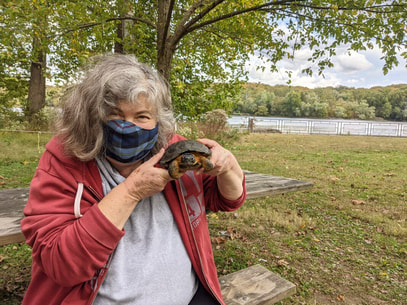 Marilyn Kupetz is one of several Fairfax Master Naturalist volunteers whose service has made a difference at Riverbend Park in Fairfax County. Photo by Valeria Espinoza.
Marilyn Kupetz is one of several Fairfax Master Naturalist volunteers whose service has made a difference at Riverbend Park in Fairfax County. Photo by Valeria Espinoza. Making a Difference at Riverbend Park
--Submitted by Valeria Espinoza (Volunteer Coordinator, Riverbend Park/Scott's Run Nature Preserve, Fairfax County)
VMN volunteers in the Fairfax Chapter have volunteered in many roles at the Fairfax County Park Authority's Riverbend Park over the years, but in 2020, they went the extra mile to help with the unique challenges the park faced. Here are stories of some of the ways they have contributed.
Marilyn Kupetz has volunteered at Riverbend for almost two years now. She serves as an Animal Caretaker and Roving Naturalist. Marilyn plays a key role as part of our Animal Care team. From enrichment to health monitoring, Marilyn helps us make sure the animals are happy and healthy. She is a volunteer who has gone above and beyond her role. She has also volunteered at cleanups and other park events. This year, she committed to assisting with park monitoring as a Roving Naturalist when we could only offer outdoor volunteer opportunities. Now she continues to fulfill both roles every week. Her support this year has made a remarkable difference to our park!
Scott Schroth began volunteering at our parks in the summer of 2018. He has done so much since! From trail projects with boy scouts to invasive removal projects and supporting our festivals, Scott has become one of our most dedicated volunteers. This year, he supported us with the biggest challenge we faced due to the pandemic. An increased amount of trash and litter at Scott's Run Nature Preserve resulting from increased visitor turnout along with a decrease in staffing. Scott serves as a Lead Volunteer for our cleanups along with Toni Oliveira. Thanks to their support, we were able to run cleanup events every weekend to keep up with the growing amount of trash.
Toni Oliveira is someone who has gone above and beyond to carry our mission to protect and preserve our parks. Toni has volunteered with us for over a year now and has participated in several projects both at Riverbend and Scott’s Run. She has helped with park monitoring, trail maintenance projects, and watershed cleanup events. This year she adopted a spot at Riverbend where she restored a section of the park by removing invasives and seeding native grasses/plants. She has also helped staff with park monitoring at Scott's Run and has become a key player in our restoration efforts by serving as a Lead Volunteer at our weekend cleanups. Toni’s commitment, positivity, and determination have made a huge difference at both parks!
Tom Blackburn has volunteered at Riverbend for over 5 years! He has supported our interpretive programs, festivals, and park cleanups. This year Tom supported our trail monitoring efforts as a Roving Naturalist and once programs opened up again this fall, he assisted and lead several outdoor, socially-distanced programs. Tom has led several programs such as our Native Americans of Virginia fieldtrip, nature/ecology fieldtrips, and our Halloween Mystery at the Cabin program (a new program this year). Tom made this event very special for trick or treaters by portraying the character of a bootlegger's ghost! During the shutdown, Tom served as a guest speaker at the Wildlife Explorers camp. He provided insight and knowledge on birds to our campers who truly enjoyed their experience.
Nancy Yinger, a Master Naturalist, has participated in the wildflower survey for over a year now. Last year, she also partook in the Caterpillars Count! Arthropod Survey. This year, she has continued surveying the park’s wildflowers while supporting our trail monitoring efforts. She has also “adopted” a pollinator garden by the Visitor Center. With her assistance, we plan to re-design this garden to better support Riverbend's pollinators and educate visitors about native plants & flowers that support them. We are very lucky to have Nancy as part of our volunteer community.
--Submitted by Valeria Espinoza (Volunteer Coordinator, Riverbend Park/Scott's Run Nature Preserve, Fairfax County)
VMN volunteers in the Fairfax Chapter have volunteered in many roles at the Fairfax County Park Authority's Riverbend Park over the years, but in 2020, they went the extra mile to help with the unique challenges the park faced. Here are stories of some of the ways they have contributed.
Marilyn Kupetz has volunteered at Riverbend for almost two years now. She serves as an Animal Caretaker and Roving Naturalist. Marilyn plays a key role as part of our Animal Care team. From enrichment to health monitoring, Marilyn helps us make sure the animals are happy and healthy. She is a volunteer who has gone above and beyond her role. She has also volunteered at cleanups and other park events. This year, she committed to assisting with park monitoring as a Roving Naturalist when we could only offer outdoor volunteer opportunities. Now she continues to fulfill both roles every week. Her support this year has made a remarkable difference to our park!
Scott Schroth began volunteering at our parks in the summer of 2018. He has done so much since! From trail projects with boy scouts to invasive removal projects and supporting our festivals, Scott has become one of our most dedicated volunteers. This year, he supported us with the biggest challenge we faced due to the pandemic. An increased amount of trash and litter at Scott's Run Nature Preserve resulting from increased visitor turnout along with a decrease in staffing. Scott serves as a Lead Volunteer for our cleanups along with Toni Oliveira. Thanks to their support, we were able to run cleanup events every weekend to keep up with the growing amount of trash.
Toni Oliveira is someone who has gone above and beyond to carry our mission to protect and preserve our parks. Toni has volunteered with us for over a year now and has participated in several projects both at Riverbend and Scott’s Run. She has helped with park monitoring, trail maintenance projects, and watershed cleanup events. This year she adopted a spot at Riverbend where she restored a section of the park by removing invasives and seeding native grasses/plants. She has also helped staff with park monitoring at Scott's Run and has become a key player in our restoration efforts by serving as a Lead Volunteer at our weekend cleanups. Toni’s commitment, positivity, and determination have made a huge difference at both parks!
Tom Blackburn has volunteered at Riverbend for over 5 years! He has supported our interpretive programs, festivals, and park cleanups. This year Tom supported our trail monitoring efforts as a Roving Naturalist and once programs opened up again this fall, he assisted and lead several outdoor, socially-distanced programs. Tom has led several programs such as our Native Americans of Virginia fieldtrip, nature/ecology fieldtrips, and our Halloween Mystery at the Cabin program (a new program this year). Tom made this event very special for trick or treaters by portraying the character of a bootlegger's ghost! During the shutdown, Tom served as a guest speaker at the Wildlife Explorers camp. He provided insight and knowledge on birds to our campers who truly enjoyed their experience.
Nancy Yinger, a Master Naturalist, has participated in the wildflower survey for over a year now. Last year, she also partook in the Caterpillars Count! Arthropod Survey. This year, she has continued surveying the park’s wildflowers while supporting our trail monitoring efforts. She has also “adopted” a pollinator garden by the Visitor Center. With her assistance, we plan to re-design this garden to better support Riverbend's pollinators and educate visitors about native plants & flowers that support them. We are very lucky to have Nancy as part of our volunteer community.
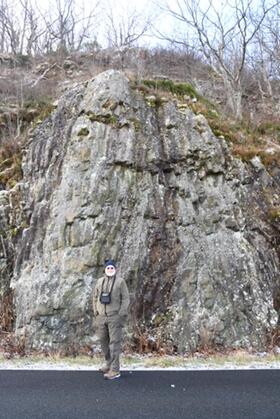 VMN trainee Tom Gill visiting Shenandoah National Park as part of a self-guided geology field learning experience.
VMN trainee Tom Gill visiting Shenandoah National Park as part of a self-guided geology field learning experience. Field Trips: Going the Distance for Basalt, Bluebirds and Birches
--Submitted by Bonnie Beers, Kathleen Aucoin, Charlene Uhl, and Barry Buschow, VMN Old Rag Chapter
When the Old Rag Chapter's Basic Training Class X launched last fall, its coordinators – Bonnie Beers, Kathleen Aucoin and tech guru, Alex Bueno – shifted to Zoom classes for virtual distance during the COVID-19 pandemic. The nineteen class members and the expert presenters settled into the new environment and made the most of each session. But…what to do about the group field trips, the essential learning component that gives trainees hands-on experience in the natural world? These determined class leaders revamped three field trips into enriching outdoor activities that also met Virginia guidelines for masks, group sizes and social distancing.
For geology, Dorothy “Tepp” Tepper, Old Rag’s member geologist and expert presenter for the class, proposed a self-guided geology tour in the Shenandoah National Park. Tepp and Alex worked tirelessly to create the virtual tour that combines slides, diagrams, satellite imagery and an audio overlay and transcript. It resides in Dropbox for viewing and downloading to laptops or mobile devices to “take along” on the tour. Tepp also gained permission from the Shenandoah National Park Association to use diagrams from their publication, “Geology Along Skyline Drive” by Robert Badger.
Tepp selected nine stops along Skyline Drive that illustrate unique aspects of the park’s geologic features and history.
The Ornithology field trip took advantage of February’s 24th Great Backyard Bird Count, cosponsored by the Audubon Society and Cornell Lab for Ornithology. This global community science activity gave Class X members an opportunity to use bird ID tools and practice their birding skills while logging volunteer hours on an ORMN project.
As the Covid-19 guidelines were extended into February 2021, Kathleen and Bonnie knew that their third field trip, the planned Forest Ecology tour of a historic forest, would not be feasible in March or April. They researched and then adapted a classroom exercise featured in the VMN on-line Basic Training Class for Forest Ecology and Management. This field trip sends Class X members outdoors to think about forest management—how you set goals and then define strategies to achieve them.
For the Old Rag chapter, Covid-19 brought many changes to their plans for Basic Training Class X, but none have been insurmountable. Virginia's outdoor resources offer opportunities every day to learn in nature. Thankfully, they are going the distance…while maintaining the distance!
--Submitted by Bonnie Beers, Kathleen Aucoin, Charlene Uhl, and Barry Buschow, VMN Old Rag Chapter
When the Old Rag Chapter's Basic Training Class X launched last fall, its coordinators – Bonnie Beers, Kathleen Aucoin and tech guru, Alex Bueno – shifted to Zoom classes for virtual distance during the COVID-19 pandemic. The nineteen class members and the expert presenters settled into the new environment and made the most of each session. But…what to do about the group field trips, the essential learning component that gives trainees hands-on experience in the natural world? These determined class leaders revamped three field trips into enriching outdoor activities that also met Virginia guidelines for masks, group sizes and social distancing.
For geology, Dorothy “Tepp” Tepper, Old Rag’s member geologist and expert presenter for the class, proposed a self-guided geology tour in the Shenandoah National Park. Tepp and Alex worked tirelessly to create the virtual tour that combines slides, diagrams, satellite imagery and an audio overlay and transcript. It resides in Dropbox for viewing and downloading to laptops or mobile devices to “take along” on the tour. Tepp also gained permission from the Shenandoah National Park Association to use diagrams from their publication, “Geology Along Skyline Drive” by Robert Badger.
Tepp selected nine stops along Skyline Drive that illustrate unique aspects of the park’s geologic features and history.
- Alex, Bonnie and Kathleen joined Tepp on Skyline Drive to take photographs, refine directions to each stop, and subsequently to “test drive” the field trip before releasing it to the trainees in November.
- Trainees can opt to take the self-guided tour in groups of up to three other classmates. They may take the tour at any time before the training class ends in April.
- The first small groups took 4 hours to complete the nine-stop itinerary and reported they were able to help each other identify and understand the geology at each stop, as well as build camaraderie with their classmates.
- Early reviews are enthusiastic.
The Ornithology field trip took advantage of February’s 24th Great Backyard Bird Count, cosponsored by the Audubon Society and Cornell Lab for Ornithology. This global community science activity gave Class X members an opportunity to use bird ID tools and practice their birding skills while logging volunteer hours on an ORMN project.
- Trainee preparatory materials included readings on bird identification/behavior, learning modules on eBird and audio bird recordings on Merlin and the American Museum of Natural History’s website. All trainees were encouraged to download a bird ID application on a mobile device.
- Trainees opted to participate individually, with a small team at a chosen site or at one of two properties whose owners provided a description of habitats and birds that are regularly seen (each site limited to 6 people each).
- The Ornithology field activity enabled adherence to the pandemic restrictions and also permitted sharing of the knowledge, skills and experience of the coordinators and trainees in small group learning situations. Several mentors participated, contributing additional value to the event.
As the Covid-19 guidelines were extended into February 2021, Kathleen and Bonnie knew that their third field trip, the planned Forest Ecology tour of a historic forest, would not be feasible in March or April. They researched and then adapted a classroom exercise featured in the VMN on-line Basic Training Class for Forest Ecology and Management. This field trip sends Class X members outdoors to think about forest management—how you set goals and then define strategies to achieve them.
- Working as individuals or in small groups, the trainees will conduct a site survey of a forested area of their choosing and create a sketch of the key features and trees on the site. Using the sketch, they will list their forest priorities and then craft steps to achieve those priorities.
For the Old Rag chapter, Covid-19 brought many changes to their plans for Basic Training Class X, but none have been insurmountable. Virginia's outdoor resources offer opportunities every day to learn in nature. Thankfully, they are going the distance…while maintaining the distance!

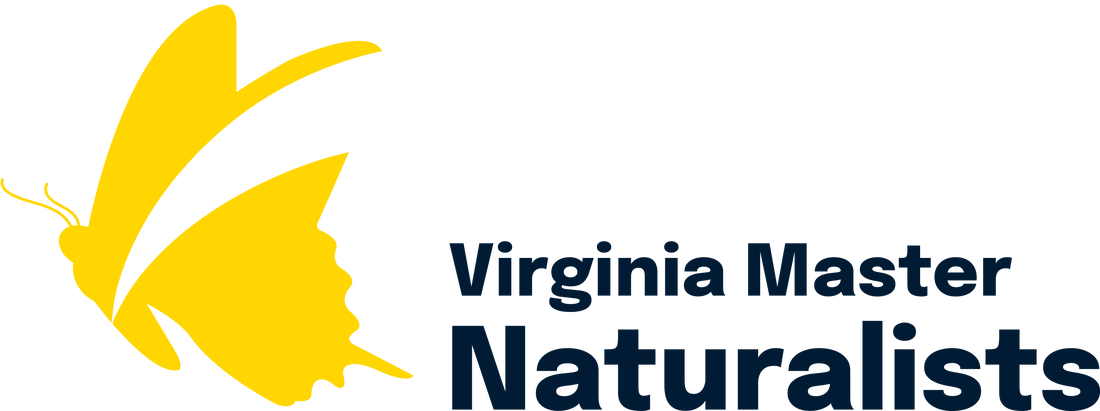
 RSS Feed
RSS Feed